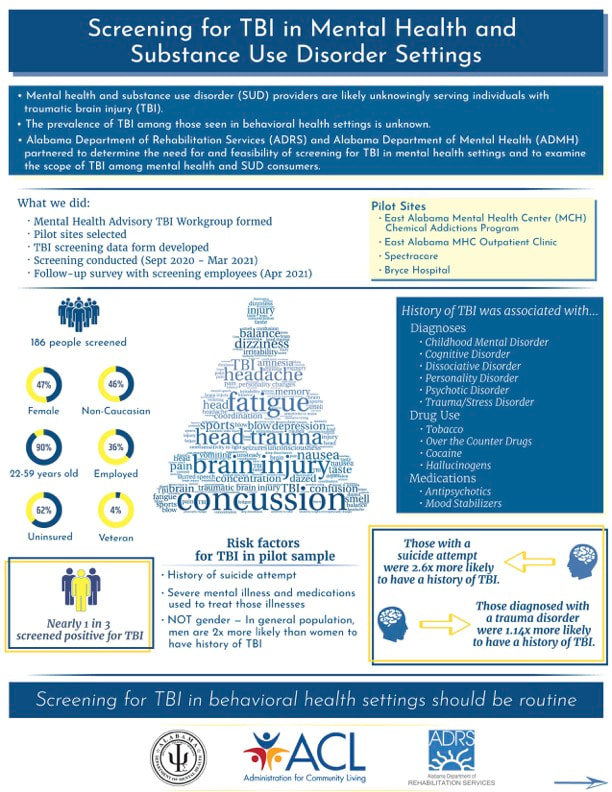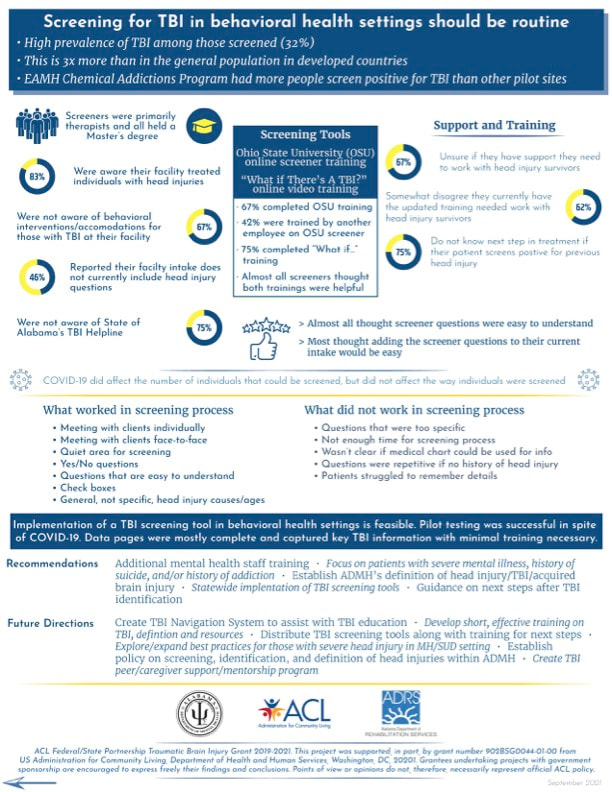Traumatic Brain Injury:
The Silent Epidemic & Behavioral Health
Download the informational handout to follow along with during
the TBI training video for Behavioral Health professionals.
CLICK HERE
The Silent Epidemic & Behavioral Health
Download the informational handout to follow along with during
the TBI training video for Behavioral Health professionals.
CLICK HERE
In FY21, the ADRS Traumatic Brain Injury Program concluded a two-year Federal Administration for Community Living grant, partnering with the Alabama Department of Mental Health (ADMH) to screen, identify and customize treatment interventions for individuals with TBI within the state behavioral health and substance use disorder programs. The 2021 TBI/ADMH dissemination report showed 1 in 3 individuals within the mental health system screened positive for a TBI, those with a suicide attempt were 2.6X likely to have a TBI and those diagnosed with a trauma disorder were 1.14X more likely to have a history of TBI.
WEBINAR: What If There's a Traumatic Brain Injury?
|
Click on image to watch the webinar "What If There's a Traumatic Brain Injury?" on YouTube.
|
Click on image to watch the webinar "What If There's a Traumatic Brain Injury?" (with Interpreter) on YouTube.
|
For accommodation requests, please contact:
April Turner at 1-205-290-4590 or [email protected]
*Requests should be made 2 weeks prior to accessing webinar.
April Turner at 1-205-290-4590 or [email protected]
*Requests should be made 2 weeks prior to accessing webinar.
Intensive Training on TBI Screening using the OSU TBI-ID
CLICK HERE FOR TRAINING
Mental Health / TBI Screening Form
CLICK HERE TO PRINT
WEBINAR: Accommodations / Behavior Interventions for Mental Health Professionals
Click on image to watch the webinar "Accommodations/Behavior Interventions for Mental Health Professionals" on YouTube.
TBI & Mental Health/Addiction Disorders - Best Practices for Supporting Challenges
Brandeis - Opioid Use Among People with Traumatic Brain Injury
Brandeis - Opioid Use Among People with Traumatic Brain Injury (Plain-Language Version)
Opioid Use Disorder Among People with Disabilities Fact Sheet - Medical Treatment
Intersection Between Traumatic Brain Injury and Opioid Use Disorder - Recommendations For Substance Use Treatment Providers
Peer Support For People with Substance Use Disorders
Connecting People with Disabilities and Opioid Use Disorder to Technology-Based Peer Support
For Professionals: Lived Experience Tipsheet- NCAPPS
PBS Special- Overdose and Brain Injury
Naloxone for First Responders
Brandeis - Opioid Use Among People with Traumatic Brain Injury
Brandeis - Opioid Use Among People with Traumatic Brain Injury (Plain-Language Version)
Opioid Use Disorder Among People with Disabilities Fact Sheet - Medical Treatment
Intersection Between Traumatic Brain Injury and Opioid Use Disorder - Recommendations For Substance Use Treatment Providers
Peer Support For People with Substance Use Disorders
Connecting People with Disabilities and Opioid Use Disorder to Technology-Based Peer Support
For Professionals: Lived Experience Tipsheet- NCAPPS
PBS Special- Overdose and Brain Injury
Naloxone for First Responders

Resources from Partners in Progress: Addressing Traumatic Brain Injury, Mental Health and Addiction
Conference Agenda May 23-24, 2019
Brain Injury and Behavioral Health - Brian Hepburn, MD; NASMHPD
TBI, Mental Health and Addiction - John Corrigan, PhD
TBI, Opioids, and CDC TBI Projects - Julie Haarbauer-Krupa, PhD
Identifying and Accommodating TBI in Behavioral Health Treatment - John Corrigan, PhD
TBI Resources: Alabama’s Programs and Services - Maria Crowley and Scott Powell
Children and Youth: Pediatric Resources and Interventions for TBI - Jesse Martinez, MD
Behavioral Health, Children and Youth - Drew Davis, MD
Medication and Behavioral Health: Managing Behavioral Issues During Acute Rehabilitation after TBI - Robert Brunner, MD and Tom Novack, PhD
Programs and Services for Mental Health, Addiction & Opioid Use - Kathy House
Assessing Children, Youth and Adults: Practical Application in TBI: Pediatric Neuropsychology - Joe Ackerson, PhD
Adult Neuropsychological Assessment - James Banos, PhD
Distracted Driving and TBI - Despina Stavrinos, PhD
Alabama Disabilities Advocacy Program: Protection and Advocacy for TBI - Christy Johnson
Conference Agenda May 23-24, 2019
Brain Injury and Behavioral Health - Brian Hepburn, MD; NASMHPD
TBI, Mental Health and Addiction - John Corrigan, PhD
TBI, Opioids, and CDC TBI Projects - Julie Haarbauer-Krupa, PhD
Identifying and Accommodating TBI in Behavioral Health Treatment - John Corrigan, PhD
TBI Resources: Alabama’s Programs and Services - Maria Crowley and Scott Powell
Children and Youth: Pediatric Resources and Interventions for TBI - Jesse Martinez, MD
Behavioral Health, Children and Youth - Drew Davis, MD
Medication and Behavioral Health: Managing Behavioral Issues During Acute Rehabilitation after TBI - Robert Brunner, MD and Tom Novack, PhD
Programs and Services for Mental Health, Addiction & Opioid Use - Kathy House
Assessing Children, Youth and Adults: Practical Application in TBI: Pediatric Neuropsychology - Joe Ackerson, PhD
Adult Neuropsychological Assessment - James Banos, PhD
Distracted Driving and TBI - Despina Stavrinos, PhD
Alabama Disabilities Advocacy Program: Protection and Advocacy for TBI - Christy Johnson
This project was supported, in part by grant number 90TBSG0044-01-00, from the U.S. Administration for Community Living, Department of Health and Human Services, Washington, D.C. 20201. Grantees undertaking projects with government sponsorship are encouraged to express freely their findings and conclusions. Points of view or opinions do not, therefore, necessarily represent official ACL policy.

Traumatic Brain Injury Technical Assistance and Resource Center (TBI TARC)
Cognitive Impairment in Substance Use Disorder Treatment:
Neurologic Informed Care
June 6, 2024, 2023, 3:00-4:00 PM in Eastern Time (US and Canada)
Webinar Registration Link: https://us06web.zoom.us/webinar/register/WN_Hl5NbtgGQrqQ7A_p02vu4w#/registration
The American Society of Addiction Medicine (ASAM) is the leading professional medical society representing physicians, clinicians and associated professionals in addiction medicine. ASAM is dedicated to increasing access and improving the quality of addiction treatment, educating physicians and the public, supporting research and prevention, and promoting the appropriate role of physicians in the care of patients with addiction. The ASAM Criteria for the substance use disorder treatment is the most widely used and comprehensive set of standards for placement, continued service, and transfer of patients with addiction and co-occurring conditions. Most states use the ASAM Criteria as the foundation of their requirements for addiction treatment. The 4th Edition of the ASAM Criteria for adults was released in December 2023 and for the first time includes a chapter addressing treatment for individuals with cognitive impairment.
John D. Corrigan, PhD, ABPP, was a member of the writing group for this chapter. In this webinar he will introduce the new ASAM expectations for the treatment of persons with cognitive impairment, including "Neurologic Informed Care” as described in the new criteria. Implications for the identification of people in treatment who have a history of brain injury, as well as the use of accommodations to make treatment more accessible, will be discussed.
Cognitive Impairment in Substance Use Disorder Treatment:
Neurologic Informed Care
June 6, 2024, 2023, 3:00-4:00 PM in Eastern Time (US and Canada)
Webinar Registration Link: https://us06web.zoom.us/webinar/register/WN_Hl5NbtgGQrqQ7A_p02vu4w#/registration
The American Society of Addiction Medicine (ASAM) is the leading professional medical society representing physicians, clinicians and associated professionals in addiction medicine. ASAM is dedicated to increasing access and improving the quality of addiction treatment, educating physicians and the public, supporting research and prevention, and promoting the appropriate role of physicians in the care of patients with addiction. The ASAM Criteria for the substance use disorder treatment is the most widely used and comprehensive set of standards for placement, continued service, and transfer of patients with addiction and co-occurring conditions. Most states use the ASAM Criteria as the foundation of their requirements for addiction treatment. The 4th Edition of the ASAM Criteria for adults was released in December 2023 and for the first time includes a chapter addressing treatment for individuals with cognitive impairment.
John D. Corrigan, PhD, ABPP, was a member of the writing group for this chapter. In this webinar he will introduce the new ASAM expectations for the treatment of persons with cognitive impairment, including "Neurologic Informed Care” as described in the new criteria. Implications for the identification of people in treatment who have a history of brain injury, as well as the use of accommodations to make treatment more accessible, will be discussed.




